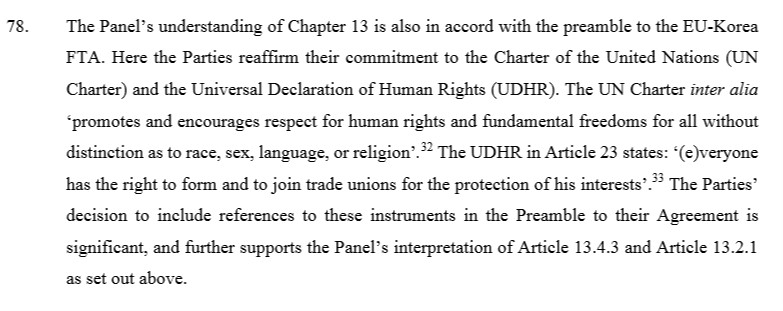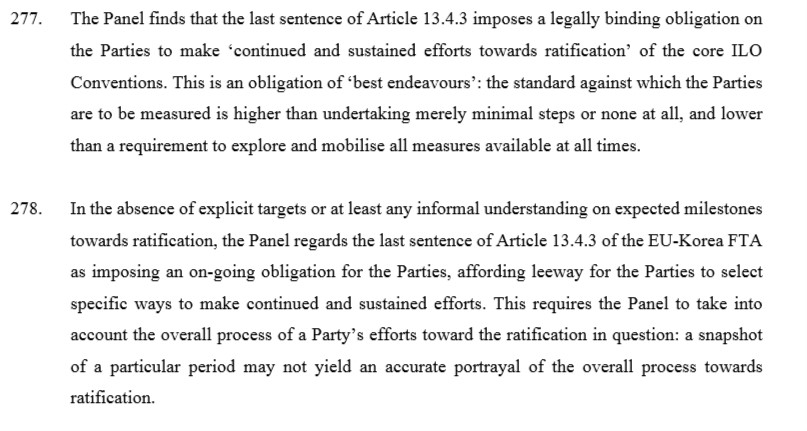The panel report in the 
 TSD dispute is now available. Its available here https://trade.ec.europa.eu/doclib/html/159358.htm together with the Commission’s news item https://trade.ec.europa.eu/doclib/press/index.cfm?id=2238. A (longish) thread highlighting some of the main findings: @Trade_EU @DRedonnet
TSD dispute is now available. Its available here https://trade.ec.europa.eu/doclib/html/159358.htm together with the Commission’s news item https://trade.ec.europa.eu/doclib/press/index.cfm?id=2238. A (longish) thread highlighting some of the main findings: @Trade_EU @DRedonnet

 TSD dispute is now available. Its available here https://trade.ec.europa.eu/doclib/html/159358.htm together with the Commission’s news item https://trade.ec.europa.eu/doclib/press/index.cfm?id=2238. A (longish) thread highlighting some of the main findings: @Trade_EU @DRedonnet
TSD dispute is now available. Its available here https://trade.ec.europa.eu/doclib/html/159358.htm together with the Commission’s news item https://trade.ec.europa.eu/doclib/press/index.cfm?id=2238. A (longish) thread highlighting some of the main findings: @Trade_EU @DRedonnet
1st, it’s worth recalling that the dispute is about whether  respects the principles concerning certain fundamental labour rights and whether
respects the principles concerning certain fundamental labour rights and whether  had made continued and sustained efforts towards ratifying certain core @ilo Conventions which it had not yet ratified.
had made continued and sustained efforts towards ratifying certain core @ilo Conventions which it had not yet ratified.
 respects the principles concerning certain fundamental labour rights and whether
respects the principles concerning certain fundamental labour rights and whether  had made continued and sustained efforts towards ratifying certain core @ilo Conventions which it had not yet ratified.
had made continued and sustained efforts towards ratifying certain core @ilo Conventions which it had not yet ratified.
2nd, in its ruling on jurisdiction, the panel decided that these commitments were not subject to a “trade effects” test. It developed this from the fact that the ILO Constitution and 1998 ILO Convention are the basis for Art 13.4.3 of the TSD Chapter.
The panel went on to examine the immediate context, noting that the Parties referred to the ILO’s Decent Work Agenda which includes the promotion of the core ILO standards. It described that as forming the "ethical framework" in which the Parties chose to place their agreement
It then referred to the preamble to the FTA, giving significance to the reference to the Universal Declaration on Human Rights which protects the freedom of association.
The panel confirmed that the FTA should not be understood as seeking to harmonise labour protection. Rather these provisions set basic core rights, the “rules of the game” and do not seek to regulate the domestic labour regime as a whole
The panel concludes that while there is no "trade effects" test for these provisions, there is a link between trade and the provisions because of their interconnectedness, such that the fundamental rights protected set a “floor”, an "integral component" of the system
3rd, the panel examined the nature of the commitment to respect the principles concerning fundamental rights deriving from the ILO Convention. It confirmed that these principles applied even if the ILO Convention had not been ratified: the FTA creates an independent obligation.
The panel goes onto find several aspects of the Korean Trade Union Act to be inconsistent with the principle of freedom of association. These included the status of self-employed workers, dismissed and unemployed workers and rules on eligibility for election as union officials.
It finds that the rules on certification of unions, as clarified in a decision of the Korean Constitutional Court, are not inconsistent with the FTA, whilst noting that the Parties should continue to consult on the concrete application of this provision.
4th, the panel examines the requirement for “continued and sustained” efforts to ratify the fundamental ILO Conventions. Here it confirms that there is a legally binding and ongoing obligation to take steps towards ratification.
The panel finds that, while Korea’s efforts have been “less than optimal”, it has nevertheless respected, in particular since taking legislative action in 2019, its obligations. The EU has agreed that these steps were significant, but had argued that they were insufficient.
The panel notes that it expects, in relation to ILO Convention 105, that ratification to be completed in an expeditious manner. This would seem to be the implication for all of the fundamental ILO conventions based on the panel’s reasoning.
And to conclude a note on timing. This panel proceeding was beset by delays, first from the need to change the Korean list of experts, then by the ill health and the unfortunate death of the original chair, then the need to appoint a new chair and then COVID-19.
These were largely outside the control of the Parties but in any event @Trade_EU will learn lessons and seek to improve for the future. All the documents in this dispute are here: https://ec.europa.eu/trade/policy/accessing-markets/dispute-settlement/bilateral-disputes/

 Read on Twitter
Read on Twitter













